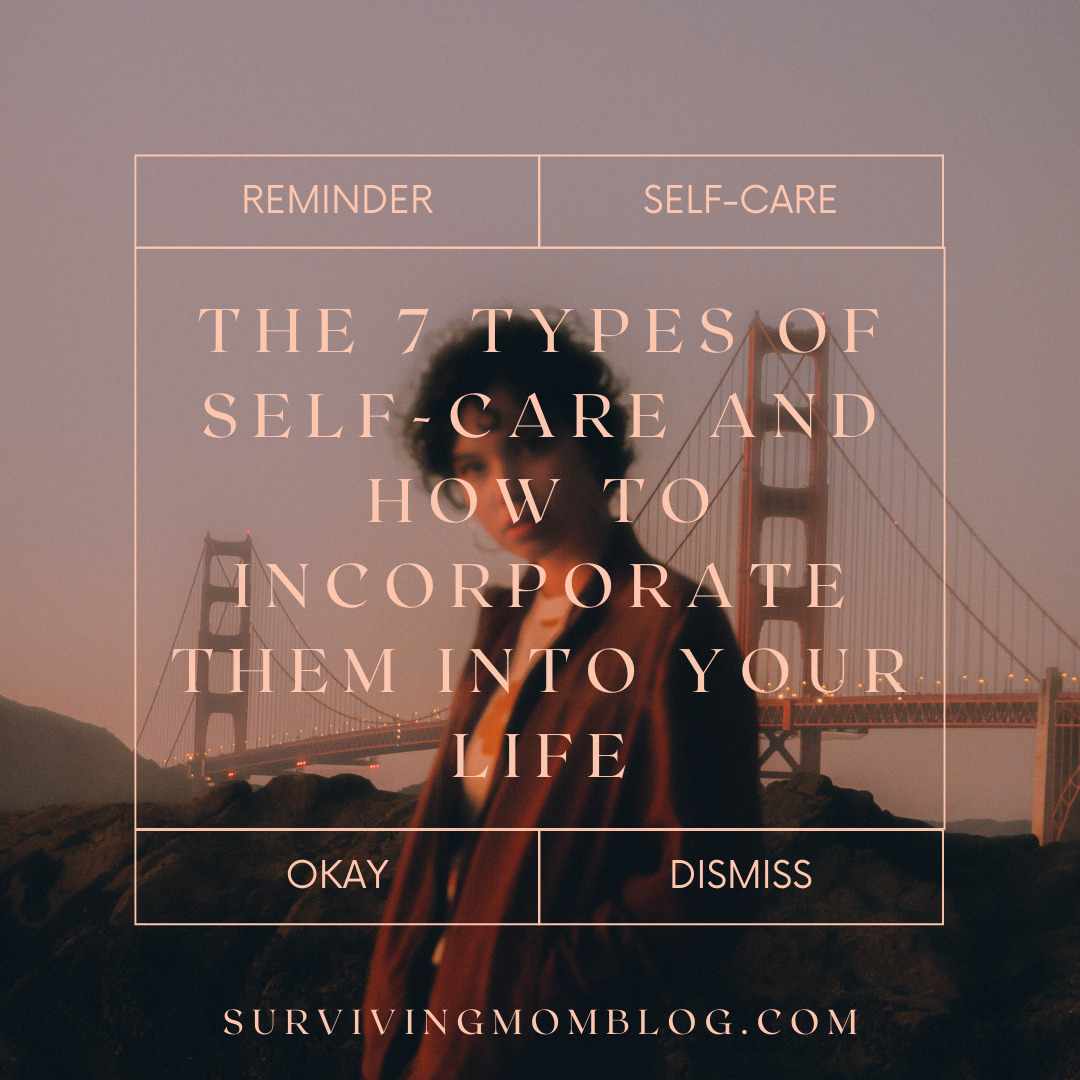
Self-care is something that many of us take for granted. We are so busy taking care of others, that we often neglect our own well-being. The saying that you can’t pour from an empty cup is so true. Without self-care, we experience burnout, resentment, overwhelm, anxiety, and fatigue. There are 7 types of self-care, and it is important to incorporate them into our routine.
What are the 7 types of self-care?
(1) Emotional self-care
Processing our emotions in a healthy way is key. Having self-compassion and practicing healthy coping mechanisms allows us to feel whatever it is we are feeling without judgment. This is necessary to regulate our feelings.
Examples of emotional self-care
- Setting boundaries with others– Communicating our emotional needs to others allows us to prioritize our emotions and have healthy relationships with others. (theblissfullmind.com, 2021)
- Positive affirmations– Write down or say aloud affirmations or mantras that help you to regulate your emotions.
- Journaling about your feelings and experiences– Writing is an excellent outlet for our feelings, and it helps us to process them.
- Challenging your inner critic– The stories and belief systems engrained in us from childhood are often false. Challenging that pesky voice that tells you that you aren’t good enough is necessary to be kinder to yourself.
- Asking for help when you need it– Being attuned to when we need assistance prevents overwhelm and burnout
- Talk to a therapist– Speak to a therapist about your feelings and triggers. Having better understanding of your emotions goes a long way towards self-compassion and learning ways to manage your feelings in a healthy way.
- Breathing exercises– This practice can be incredibly helpful towards regulating emotions.
- Speaking kindly to yourself– Learning how to be your own friend is necessary in order to replace unhealthy coping mechanisms and to react to your feelings in a constructive way.
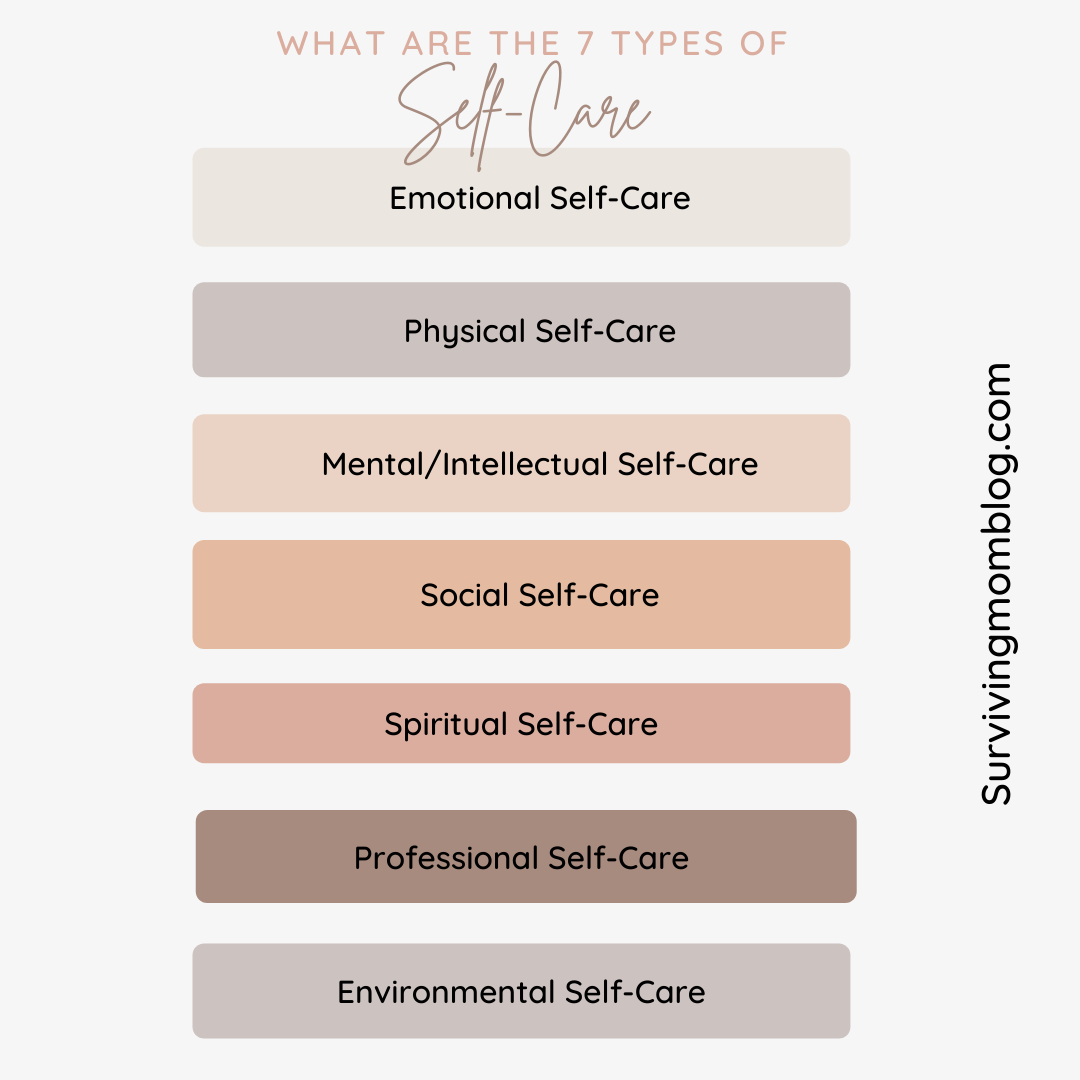
(2) Physical Self-care
This type of self-care involves anything that helps with your physical well-being. This allows you to boost your energy and strengthen your immune system.
Examples of physical self-care
- Getting enough sleep– Set a regular bedtime so that you can get a minimum of 7 hours of sleep a day.
- Be active– Taking care of your body is crucial for your physical well-being. This can be done through yoga, Pilates, walking, running, bike riding, dancing, etc.
- Go to the doctor– Make sure you get regular doctor and dentist visits, as well as other medical checks (e.g., eye doctor). When there are health concerns, do not hesitate to make an appointment with a doctor.
- Nourish your body– Eat healthy foods and take necessary vitamins.
- Stay hydrated– We are so busy that we often forget the importance of drinking fluids.
- Practice proper hygiene– Wash your hands regularly, including after using the bathroom, before meals, and after blowing your nose. Also, sneeze and cough into your elbow, change your toothbrush every 3 months (or after you are sick), and sanitize doorknobs, remote controls, and light switches.
- Know your limits– If you are feeling sick, it’s important to stop working and/or exerting yourself as much as possible. Sometimes we have no choice but to keep going, but be mindful of how your body is feeling and set limits accordingly.
- Take your medication– If your doctor prescribed you a medication, follow the directions on the label and take it as prescribed.
(3) Mental/Intellectual Self-Care
Challenging your mind and being open to learning new things is crucial for our well-being as well. This ensures that we keep growing, no matter our age.
Examples of Mental/Intellectual Self-Care
- Having a growth mindset– Seeing new challenges as an opportunity for growth rather than feeling badly about what we don’t know allows us to be lifelong learners.
- Reading– We open our minds to a world of new things when we read.
- Learn a new skill– Whether it’s playing a musical instrument or learning how to cook, acquiring new skills allows us to keep our mind sharp.
- Writing – Writing allows us to tap into our creativity and stimulate our minds. (theblissfullmind.com, 2021)
- Challenge your brain– Do a logic puzzle, a brain teaser, or anything that makes you challenge your cognition.
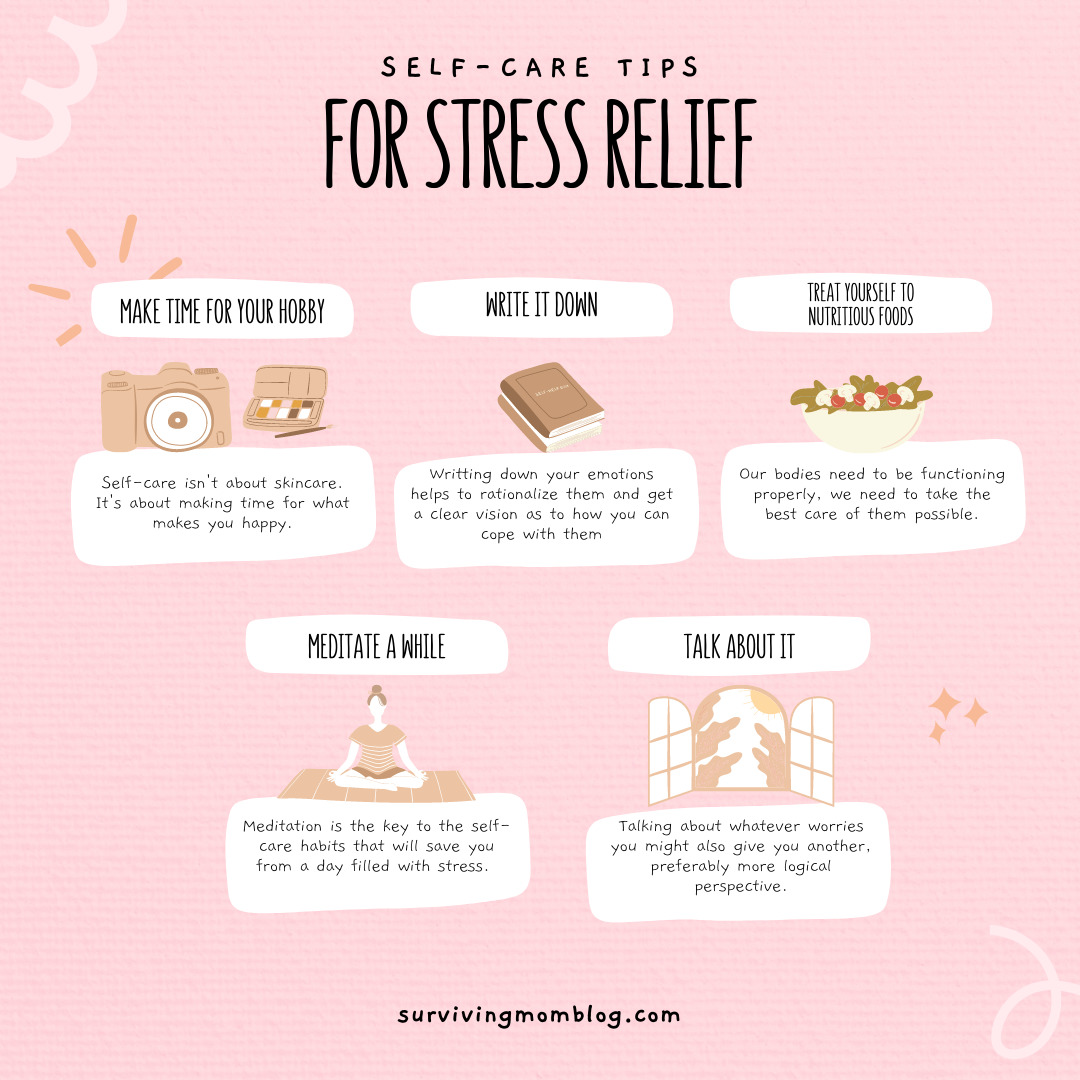
(4) Social Self-Care
Nurturing our relationships with others allows us to have support and companionship, which is necessary as human beings. Having healthy relationships with other people goes a long way towards our own well-being. Life is incredibly hectic and a constant juggling act, and there is no right or wrong amount of time to spend with others. It is up to each of us to figure out what our social needs are, and to create time for them in a way that enhances our life, as opposed to feeling like it is an extra obligation.
Examples of social self-care
- Get rid of toxic relationships– Relationships that are harmful to your well-being should be ended. I’m not saying you should end relationships because of a disagreement, but if there is a pattern of behavior that is hurtful and continues despite discussing how you feel, it is better off to sever ties.
- Schedule times to talk on the phone or meet in-person– Life can get overwhelming and plans to speak or meet up can get pushed off if there isn’t something set.
- Have a date night– If you have kids, it is easy to neglect the relationship with your significant other. Even if you can’t find a sitter, have an indoor date night after the kids have gone to sleep. It will do wonders for your well-being, as well as your relationship. (healthcoachinstitute.com, 2021)
- Choose quality over quantity– You may not have a ton of time, but even a few minutes of checking-in or sending a text are helpful to maintain relationships.
- Setting boundaries with others– In order to have healthy relationships, it is important to be honest about our needs and limits. For example- telling your friends that you won’t answer the phone after 10pm, telling your mom that questions about when you are getting married are off-limits.
- Get creative– You can invite friends along with you while you run, have a group zoom call, or chat on the phone while you are picking up your kids from school.
(5) Spiritual Self-Care
Despite what the name implies, this does not necessarily mean religion. This type of self-care means anything that enhances your soul and your purpose in life. The way that one connects with their inner spirit will differ from person to person.
Examples of spiritual self-care
- Spending time in nature– Taking walks, sitting in your backyard, or going camping are all ways to connect with the outdoors. (healthcoachinstitute.com, 2021)
- Get involved in a meaningful cause– Become a part of something that you believe in, whether it is volunteering at an animal shelter, doing fundraising, or giving to charity.
- Connecting with a power greater than yourself– That can mean prayer, attending a religious service, discovering what inspires you, or meditation.
- Identify your values– Figure out your beliefs, and be open to challenging beliefs that don’t serve you.
(6) Professional Self-care
Finding a healthy work-life balance is crucial for our self-care. Whether you work full-time, part-time, or are a Stay-at-Home-Mom (which is a job as well!), there still needs to be time set aside for you that is separate from your obligations throughout the day. (developgoodhabits.com, 2021)
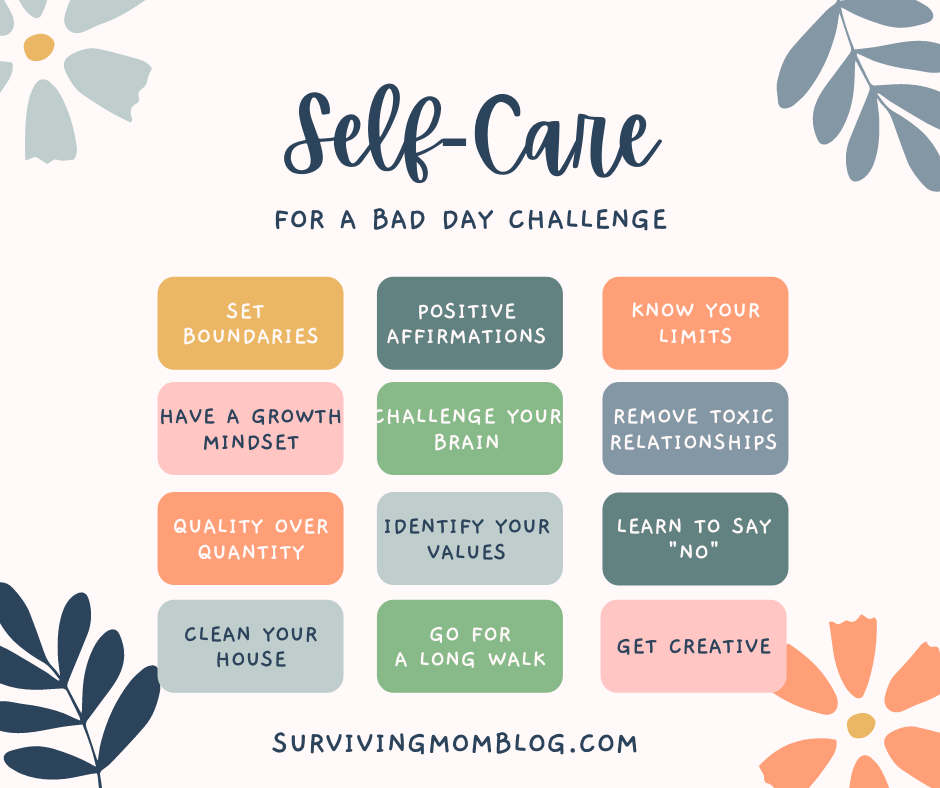
Examples of professional self-care
- Take short breaks throughout the day– Even 5 minutes to yourself every few hours is important to decompress and reduce overwhelm.
- Set a reminder to take a lunch break– Whether you are busy on a work project or chasing after kids, it is necessary to stay well-nourished.
- Turn your phone off after a certain time– Not answering emails or scrolling through your phone after an allotted time allows you to relax and unwind.
- Say no when needed– Do not bite off more than you can chew. Learning to say no to things allows you to say yes to the things that bring you joy.
- Keep lists– Writing your obligations down and staying organized ensures that you remember what you need to do and that you won’t procrastinate.
(7) Environmental Self-Care
Taking care of the spaces around you helps you to be more efficient and to also reduce stress. It also creates a sense of belonging and comfort.
Examples of environmental self-care
- Organizing your workspace– Whether it’s putting family pictures on the desk or organizing your drawers, make sure that your space promotes calmness.
- Cleaning your house– Taking the time to tidy up creates a sense of control and belonging where you live.
- Delete unnecessary emails– Reduce a cluttered inbox by deleting things that are simply taking up space.
- Sooth your senses– Put on comfortable clothes, listen to relaxing music, dim the lights, and/or eat your favorite food.
- Planning– This can mean meal-prep, setting out clothes in advance, or creating a budget.
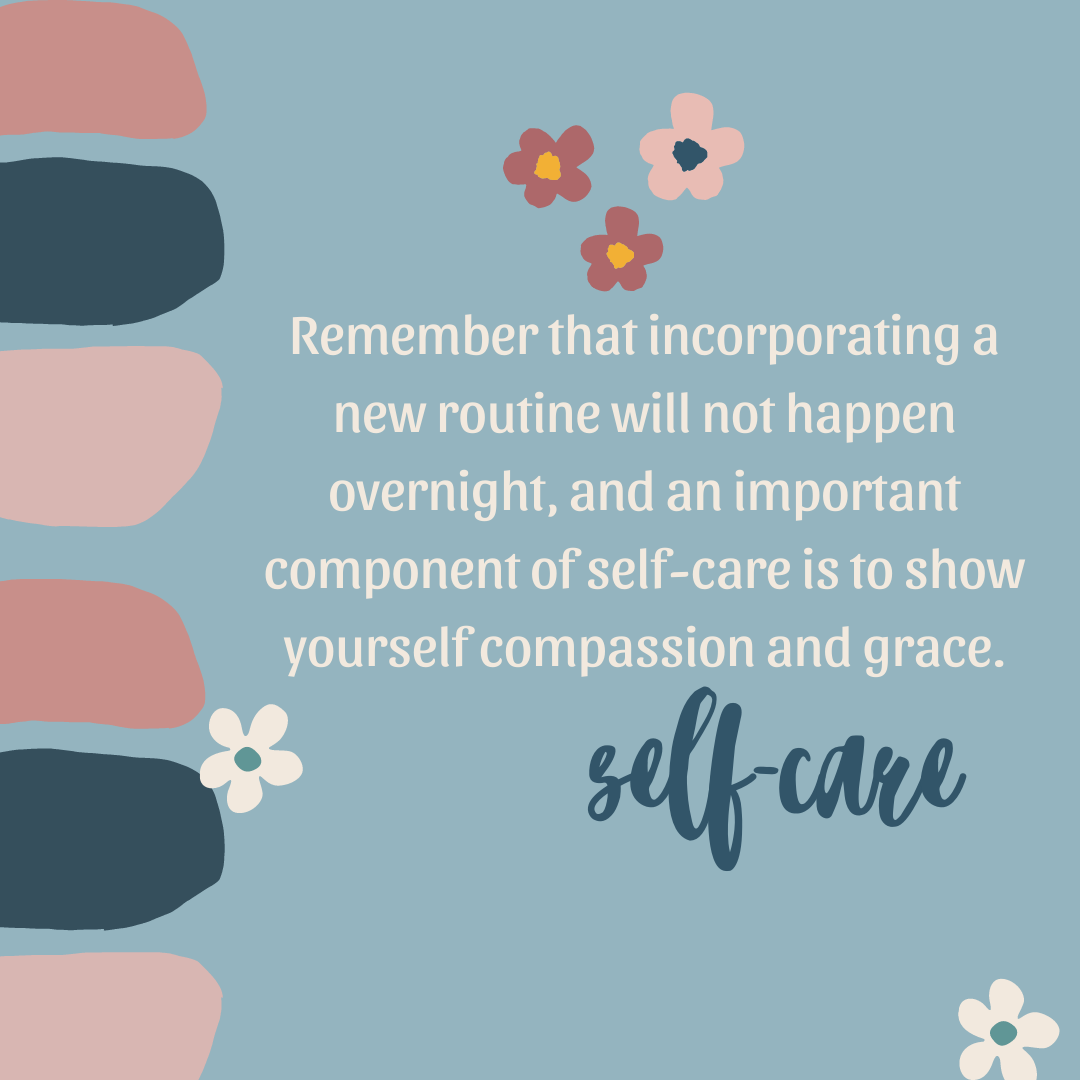
There is more to self-care than bubble baths and messages. The truth is that your well-being needs to be prioritized in all aspects of your life. Use this list and the examples provided as a guide for what type of self-care you might be neglecting. Although all areas are important, take your time incorporating additional types of self-care into your routine. See which ones need your attention more and focus on those. Your needs may differ month by month, week by week, or even day by day. The goal is to find a self-care routine that enhances your quality of life and helps you to find balance. Remember that incorporating a new routine will not happen overnight, and an important component of self-care is to show yourself compassion and grace.
P.S. If you are looking for further support to implement self-care, don’t forget to print out my FREE self-care worksheets!
Disclaimer
This post may contain affiliate links. If you purchase a product via my link I may receive a small commission at no additional cost to you. Please visit our disclaimers here


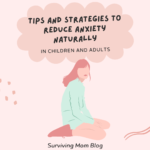

Naomi P Lane says:
At this stage of my life (in retirement) I am working on social self-care. I have just moved so I am joining a few local Meetup groups to get out of the house, meet people, and try to make new friends. I know that social isolation is not healthy and it takes effort to put myself out there. I also joined a yoga group to try and stay active.
Randi says:
That’s great that you are focusing on social self-care. It seems like you are doing a great job of getting out there and meeting new people!